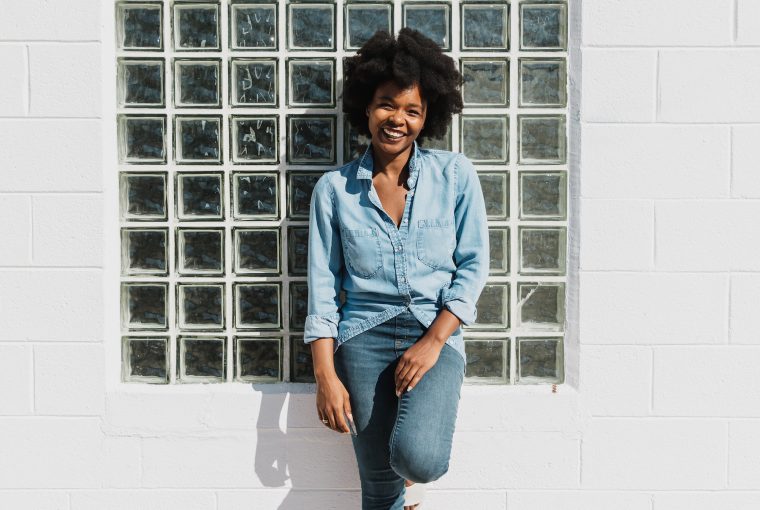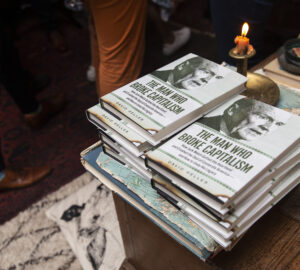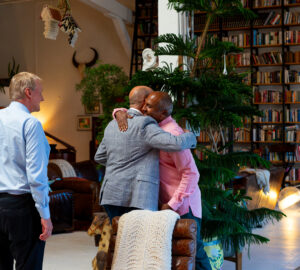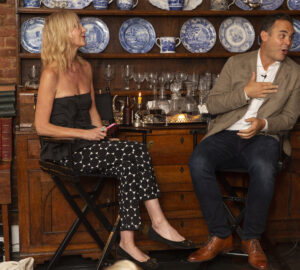She quit her job to host salons about hard conversations. Then the pandemic hit.
In spring 2020, as the world screeched to a halt, R.M. Michaële Antoine had recently left her full-time job to launch Curios, a conversation-centric salon aimed at tackling difficult topics. With the goal of bringing together friends and strangers to learn how to share diverse perspectives and swap ideas, Antoine took her salon online. What she discovered in the pandemic-frozen world was people becoming increasingly desperate for connection—even through a computer screen.
Why did you decide to launch your own salon?
Curios was born of a need to engage in deep, thoughtful curiosity-driven conversations around tough topics we don’t talk about in public spaces. Things that make us comfortable. My background is in intercultural communication and I worked for many years in higher education. A few years ago, my partner and I took a three-month sabbatical to travel and when I got back I tried to get into the flow of things, but that didn’t seem to fit anymore.
Shortly before leaving my job I started Curios. I wanted to create a brave space—not a safe one—where I’d bring in subject matter experts, and there’d be an agreement that we’re all coming here to get to know each other, dig deeper, and explore together.
What was the first salon you hosted?
We launched in November 2019 with an evening centered around the question: Why are difficult conversations so difficult to have? And, what do we do when we get uncomfortable? My guest was a professor in rhetoric and writing studies at San Diego State University, where I used to work.
I was testing it out. I rented a cozy event space from my own pocket and then I put the word out. There were a handful of friends, but a lot of people came that I didn’t know. I was buzzed afterward, with the energy you get from engaging in conversation deeper than you typically would with a stranger. To see that the conversations could have continued if there was more time felt really exhilarating. I thought, I have to keep doing these.
Had you ever been to a salon before?
No—but I was craving it. There was an aspect of formalizing something that happens informally in my existing circle. I hadn’t been to a salon but any friend would tell you when we have conversations it goes deep really quickly. We were already having these and I’m just bringing more people into the fold and making it more of a guided experience than shooting the shit with a friend. I didn’t realize that other people were doing things like salons. The idea of a salon-style conversation is also a conversation about privilege. I didn’t start craving it or knowing this was something I wanted to dig deeper into until I started to get more financial privilege.
What were some of the most memorable salons you hosted?
My second salon was in February 2020, with a curated conversation about sex and ethical porn. It included a sex ed puppet show. I was so into it. Then we had to go virtual. I hosted our first virtual conversation in June after George Floyd was killed. White folks were encouraged to listen and Black stories were shared. That one was less play and more heal. Then I hosted one in the fall about tough talks and how to navigate them, around the election and the holidays. I hosted one on authenticity and saying what we mean. I have one coming up about envy and what that reveals about ourselves.
It’s a tight rope to ask thought provoking questions while also hand-holding.
How did Covid affect your ability to host salons?
I had to pivot Curios online. Then I started looking for clients for the other side of Curios, where I work with businesses and organizations to curate workshops around difficult conversations. I started hosting a monthly virtual art showcase series.
There’s something very intimate about seeing someone face-to-face, and giving them a hug after a serious conversation. But there are pros to a computer screen, too. It might be almost easier for people to go deeper if they want to. They want a connection, they don’t want the fake shit. Everyone’s aching for when it’s face-to-face again, but there are ways to translate that.
You said there’s a certain amount of privilege in salons. How can they be democratized?
I want Curios to be really accessible. I want to give people the tools and skillset to talk about hard things. But I also want it to feel like a salon, so you feel that there are parameters around what we’re talking about tonight, and are able to explore in that space.
We as curators and hosts need to be better at putting ourselves out there to be vulnerable to inviting people into a space who haven’t been invited. You have to be really intentional about where you’re sharing the thought and perspective and network—is it just your circle?
Why is having these conversations so urgent in 2021?
I think it’s the only way we’re going to really start to see each other. The past four years were eye opening for a lot of people. For people from traditionally marginalized communities, myself included, we’d always known the things that others started realizing. It’s become impossible to ignore.
I’m wary of those who don’t have diversity around them—not just in race—but in what kind of town you grew up in, what kind of school you went to, your friend groups. I think it’s essential as we emerge from this period of lockdown that we start to expand our perceived way of being and knowing. It’s the only way we’re going to start to understand each other better.
What makes Curios unique among other salons?
Curios’ role is to at least provide a type of space that isn’t available everywhere. You’re going to work and you’re performing. You’re maybe even performing in your family, in your relationship.
I want people to walk away from a conversation feeling, if not transformed, a shift in perspective, understanding, or seeing around a particular topic. Maybe the transformation is in how they’re going to engage with their partner or someone at work. That’s how we evolve.
What do you do if the discussion gets too intense?
You kind of have to set the container for the experience we’re going to have. Not all intensity is bad. If it’s emotional or triggering but the conversation is productive, enlightening, and engaging, it’s just about figuring out that line for ourselves. We have to self regulate, but as a facilitator the question is, is it productive to the whole? Could this lead to a bigger conversation about something else? It’s always okay to step away or pause. Take a breath. Go take a drink of water. You can return to the topic after having moved away from the fight, flight, or freeze mode.
Do you have a dream salon guest?
Dave Chapelle. His experience in entertainment, as a comedian, as a Black man in this country—I just think it’d be so dope to laugh with him and unpack and dissect the human condition with him. That conversation would be called, “What can we laugh at?” I think there’s a lot of opinion and perspectives on what is and isn’t funny and what can or cannot be made funny. That would be a really fun conversation.
This interview has been edited for length and clarity.



